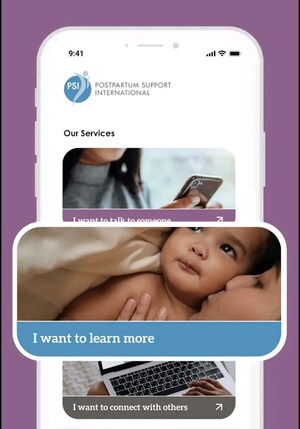PSI Celebrates International Fathers' Mental Health Day on June 17, Encourages Family and Friends to Know Symptoms and Check on Dads
PORTLAND, Ore., June 13, 2024 /PRNewswire/ -- June is a time when Americans celebrate fathers. But fatherhood isn't joyful for the thousands of dads experiencing perinatal mental health disorders (PMHDs), and many of them suffer alone. Societal norms and expectations contribute to the prevalence of these disorders. Nonprofit Postpartum Support International (PSI) is working to shatter the stigma surrounding PMHDs among fathers. Research shows:
- Postpartum depression and other PMHDs, including anxiety, obsessive-compulsive disorder, post-traumatic stress disorder, bipolar disorder, and psychosis, affect 800,000 people a year.
- At least one in 10 men suffer from postpartum depression during the perinatal period, which includes pregnancy and the year following birth.
- As many as 50% of fathers suffer from PMHDs when their partner is suffering.
- As many as 18% of fathers develop a clinically significant anxiety disorder such as generalized anxiety disorder, obsessive-compulsive disorder, and post-traumatic stress disorder at some point during their partner's pregnancy or the first year postpartum.
- Only 25% of those who suffer get help, and many parents are unaware that what they are experiencing is normal and treatable.
Founded by postpartum depression survivor Mark Williams and Psychologist and PSI Advisory Board member Daniel Singley, Ph.D., International Fathers' Mental Health Day is held annually on the day after Father's Day (June 17 this year) to highlight key aspects of paternal mental health.
"Societal norms dictate that men should be supportive and strong, which makes fathers even less likely to seek support or treatment for PMHDs, Singley said. "Dads usually don't want to admit they're struggling; they feel like they are failing their partners and their children and losing themselves in the process," Singley said.
A barrier to understanding and treatment of PMHDs in fathers is that men often exhibit different symptoms of depression. It can manifest itself as anger, irritation, frustration, and being short with people, or withdrawing from relationships. Dads may start drinking more alcohol or using other substances. Their loved ones and friends may not recognize the symptoms, and worse, may push struggling dads away at a time when they most need support.
"We are finding that many mental health professionals are not connecting the behaviors commonly displayed by men experiencing perinatal mental health disorders with the fact that the father may be depressed or have anxiety. We are working to change that," Singley said. "Nobody should have to suffer, and these conditions are common and treatable."
David Levine, M.D., a New Jersey pediatrician and vice chair of PSI's Board of Directors, suffered from postpartum depression after the birth of his first son, Zachary, in 2013.
"I thought he hated me. Every time I was around him, he would cry. And then I started to obsessively worry he was crying constantly because there was something seriously wrong with him," Levine said. As a pediatrician, I was keenly aware of all the potential issues. What I didn't know was the issue in play was my own: I was suffering from postpartum depression."
Levine kept his feelings inside, as many fathers do. When Zachary was about six weeks old, Levine had a breakdown, which led him — with the encouragement of his wife — to start therapy. "After a few months, I could finally breathe again; I was able to be the father I wanted to be, the dad Zachary and my wife needed me to be. And now I am part of a vibrant community helping other parents who are going through what I did."
Dads and their partners should know free support is available, and no diagnosis is needed to get help. PSI offers coordination, comfort, and peer support, and helps people find resources online and in their own communities. Parents can call the PSI Helpline at 1-800-944-4773 (English and Spanish), text "help" to 1-800-944-4773 (English) or 971-203-7773 (Spanish) or visit postpartum.net. New this year is Connect by PSI, an app that provides free, easy access to resources.
"Adding a child to the family is stressful for all parents. We don't talk enough about the mental health challenges that arise for mothers, but perinatal mental health disorders among fathers are discussed even less, and it's time to change that," said Wendy Davis PhD, PMH-C, president and CEO of Postpartum Support International. "As part of PSI's commitment to a whole-family approach to perinatal mental health, we are proud to sponsor the annual International Fathers' Mental Health Day on June 17 to raise awareness and decrease the stigma dads often face."
PSI has an online Perinatal Mental Health Provider Directory that lists trained providers and support groups and operates a Perinatal Psychiatric Consultation line, through which any medical provider can consult with an expert perinatal psychiatrist at no charge. PSI facilitates more than 50 free virtual support groups including those for dads, military families, LGBTQIA+ families, Spanish speakers, and more. PSI has a specialized coordinator for dads, a volunteer who provides understanding and support for fathers who are struggling.
Singley hosts PSI's Chats for Dads meetings, held the first Monday of each month, providing a space where dads, partners, extended family members or other support people, and professionals can find some answers and support from an expert and from each other. The sessions feature honest and compassionate talk about the adjustment to parenthood; information about how fatherhood can affect men; and helpful advice.
About Postpartum Support International
Postpartum Support International (PSI) was founded by a new mother in 1987 to increase awareness among public and professional communities about the emotional difficulties parents can experience during and after pregnancy. PSI offers a wealth of resources for a wide range of needs, situations, and audiences to give families the strongest and healthiest start possible through support and community. PSI also offers support, resources, best-practice training and certification for healthcare professionals and volunteer coordinators nationwide and in more than 30 countries. PSI is committed to eliminating stigma and ensuring compassionate and quality care and support are available to all families. Need help? Call 1-800-944-4PPD (4773), visit postpartum.net, or download the Connect by PSI app.
SOURCE Postpartum Support International







Share this article